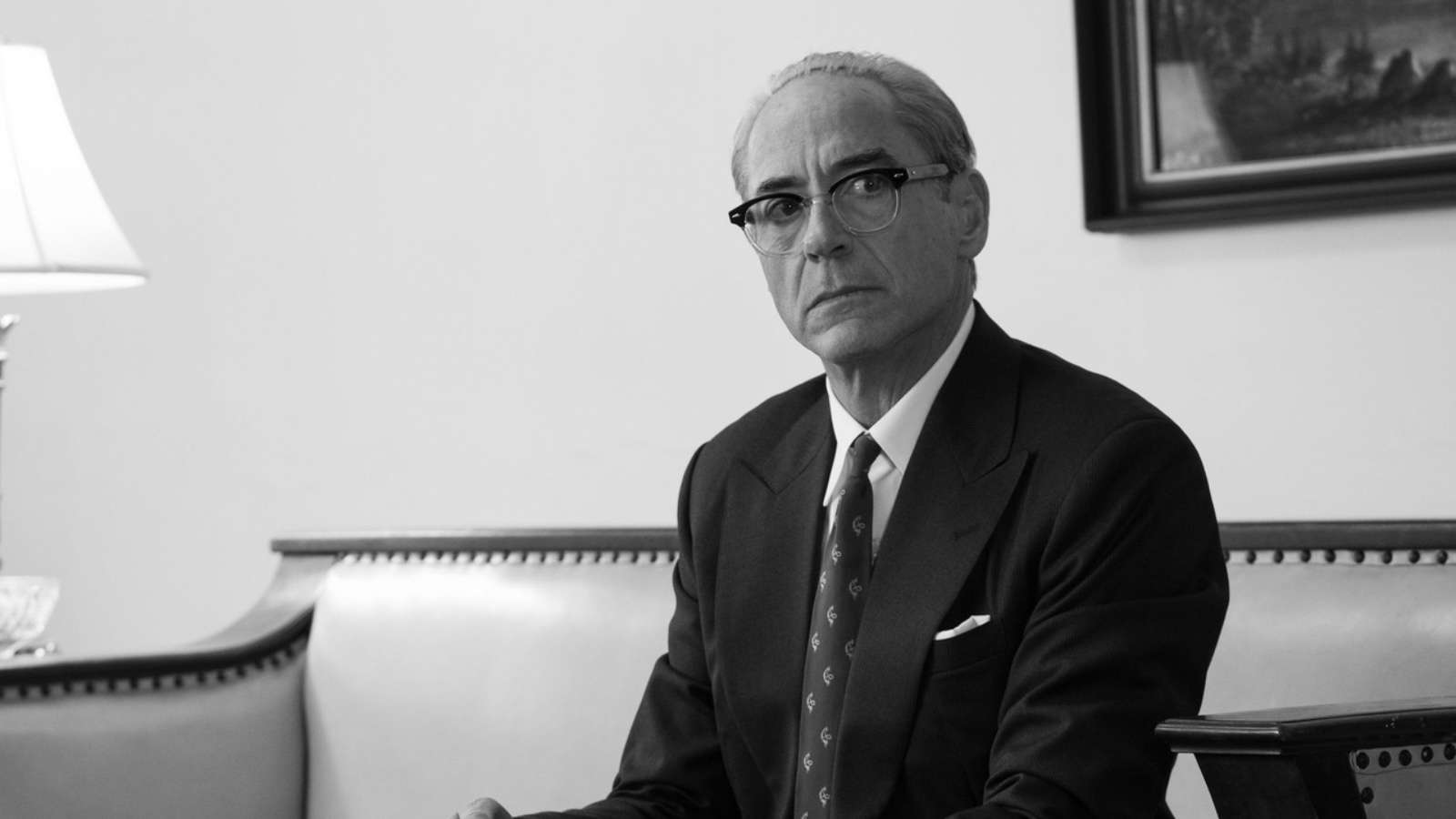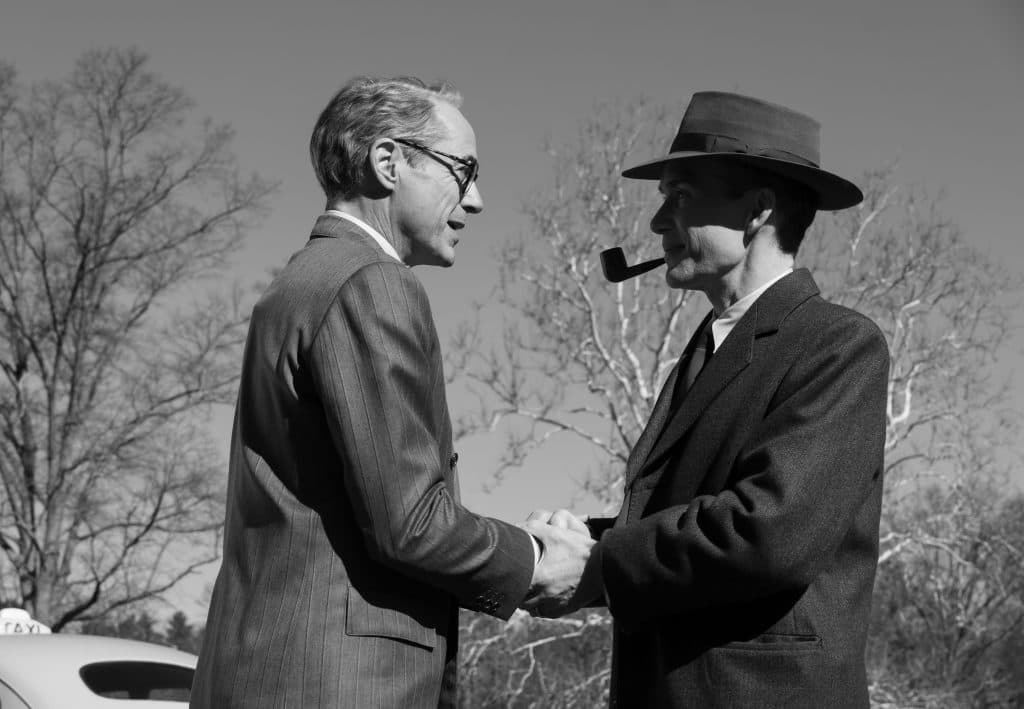Why did Lewis Strauss hate Oppenheimer?
 Universal Pictures
Universal Pictures There’s a substantial amount of information to absorb regarding Christopher Nolan’s Oppenheimer, which delves into the life and contributions of the titular physicist and his pivotal role in leading The Manhattan Project. One question on many viewers’ lips is: why did Lewis Strauss hate Oppenheimer?
In Christopher Nolan’s latest film, there’s a breath-taking display of managing the intricate timeline of the Manhattan Project, maneuvering in, out, and around its vast narrative, particularly centered on the pivotal Trinity Test that took place on July 16, 1945. While the quick-spoken storytelling may leave you a little dazed, one thing is pretty certain: Lewis Strauss did not like J. Robert Oppenheimer.
While we see the consequences of his manoeuvering against Oppenheimer in the years after the test, we primarily deal with Strauss in his time as commissioner for the Atomic Energy Commission (AEC), where he first met and subsequently clashed with the titular physicist for several reasons; some spiteful, some more ideological.
As we said, there’s quite a bit going on in the film, so you may have lost track of all that animosity between Lewis Strauss and Oppenheimer – so, here’s why he hated him.
Why did Lewis Strauss hate Oppenheimer?
In the movie, Lewis Strauss hated Oppenheimer for three reasons: they had vastly different political worldviews, both in regards to nuclear weapons and general policy; Oppenheimer embarrassed him at a public hearing; and he felt Oppenheimer had damaged his relationship with Albert Einstein.
Let’s start with that last bit: in 1947, Strauss offered Oppenheimer a job as director at the Institute for Advanced Study in Princeton, one of the most prestigious appointments in the US. In the film, their meeting is distinctively frosty, beginning with just their names and their Jewish heritages; Strauss felt like Oppenheimer had distanced himself from the Jewish community, while he’d seemingly embraced it.
Oppenheimer spoke with Einstein, and as the famed physicist walked away, he appeared to give Strauss the cold shoulder. This bothered Strauss for years, but as it turns out, it was nothing to do with him – Oppenheimer had spoken about his fears of destroying the world coming true.
 Universal Pictures
Universal PicturesAs for that hearing, Strauss had been questioned over security concerns regarding the exportation of radioactive isotopes, which he’d advocated for. Oppenheimer then not only disagreed with Strauss’ position but outright mocked it in front of everyone in attendance, which proved to be an important, bitter seed in his efforts to dismantle his career and reputation.
And then there’s the most important reason, which effectively boils down to politics. Strauss was a staunch, patriotic conservative who supported the proliferation of nuclear weaponry, including the development of the “super” hydrogen bomb. Oppenheimer was an outspoken liberal with connections to – but never any direct involvement in – the Communist Party, and they butt heads over the purpose and future of atomic bombs.
There are nuances to their disagreements, but this is the simplest version: Oppenheimer, racked by guilt in the wake of Hiroshima and Nagasaki, tried to stifle a nuclear arms race and felt international transparency and further research would be the most effective deterrence in times of war. Strauss was basically a proponent of mutually assured destruction (MAD): if it’s possible to have weapons, then it’s inevitable that our enemies (in this case, the Soviets) would build them, so we should have them too.
As outlined in No Sacrifice Too Great: The Life of Lewis L. Strauss by Richard Pfau: “Oppenheimer subsequently was a leading opponent of moving ahead with the hydrogen bomb and proposed a national security strategy based on atomic weapons and continental defence; Strauss wanted the development of thermonuclear weapons and a doctrine of deterrence.
“Oppenheimer supported a policy of openness regarding the numbers and capabilities of the atomic weapons in America’s arsenal; Strauss believed that such unilateral frankness would benefit no one but Soviet military planners.”
After Strauss’ inter-political ambush on Oppenheimer via an AEC ousting in 1954 was cited in his confirmation hearings for the position of Secretary of Commerce, his position was denied. This put an end to his government career, and he devoted more time to philanthropic activities in retirement before his death in 1974 at the age of 77.
Oppenheimer is in cinemas now. You can check out our other coverage below:
Oppenheimer review | Ending explained | Epic runtime revealed | R-rating explained | Best way to watch Oppenheimer | Christopher Nolan on sex scenes | Cast and characters | Filming locations | True story explained | Is Oppenheimer streaming? | Nolan ranked by Rotten Tomato scores | Is it based on a book? | Age-gap controversy explained | How Oppenheimer died | Christopher Nolan explains strange script | Did Japan ban Oppenheimer? | Review roundup | Does Oppenheimer have a post-credits scene? | Box office | Was Jean Tatlock murdered? | What happened to Kitty? | Why you struggle to hear Nolan’s movies | Oppenheimer’s improvised line | Could Oppenheimer earn $1bn? | Highest grossing R-rated movies
Please note that if you click on a product link on this page we may earn a small affiliate commission